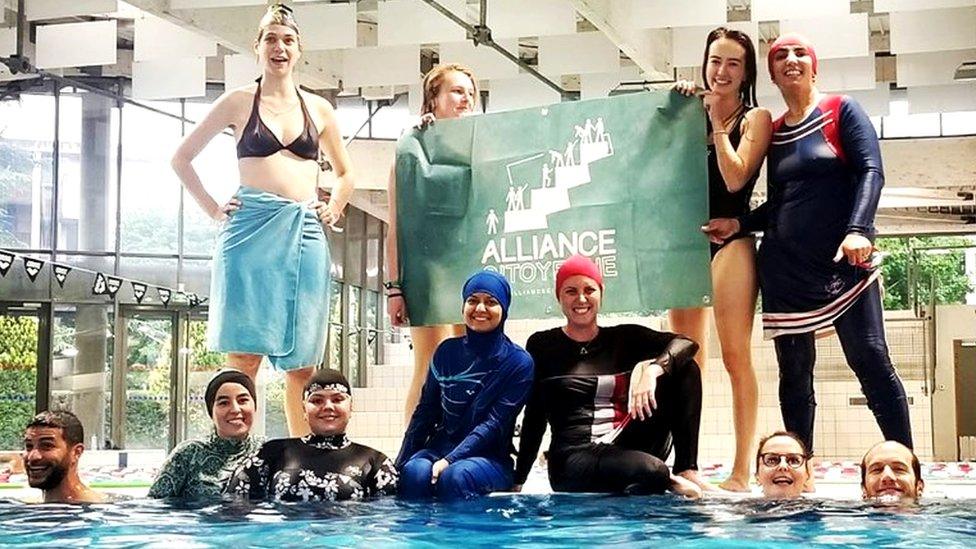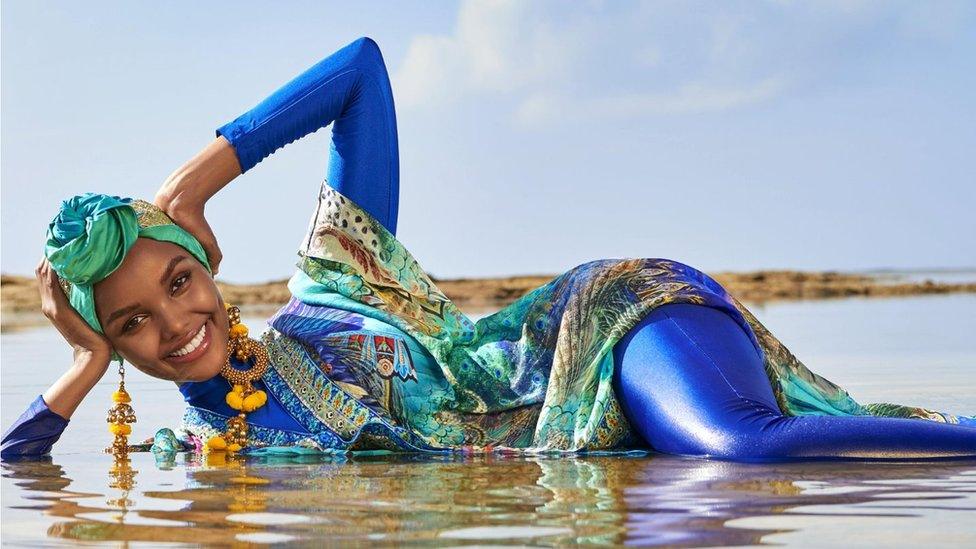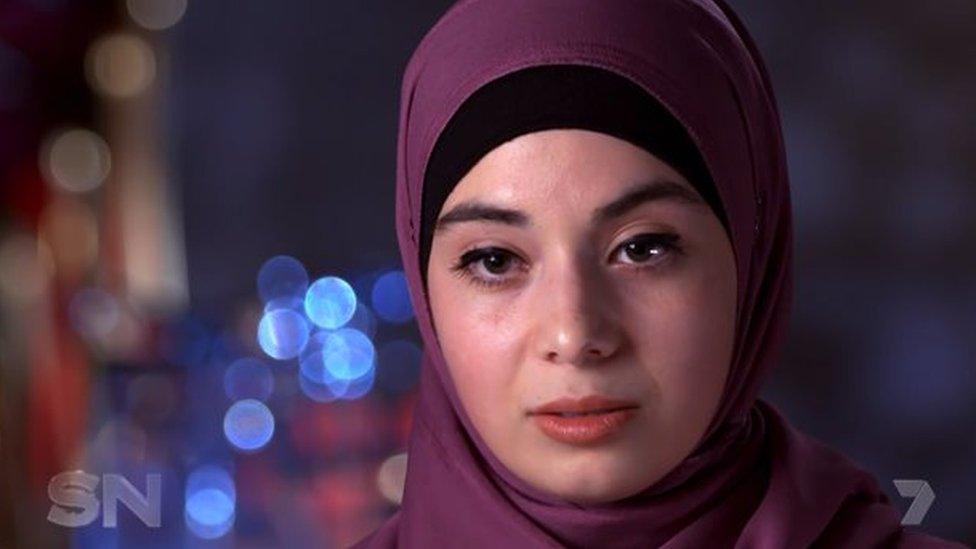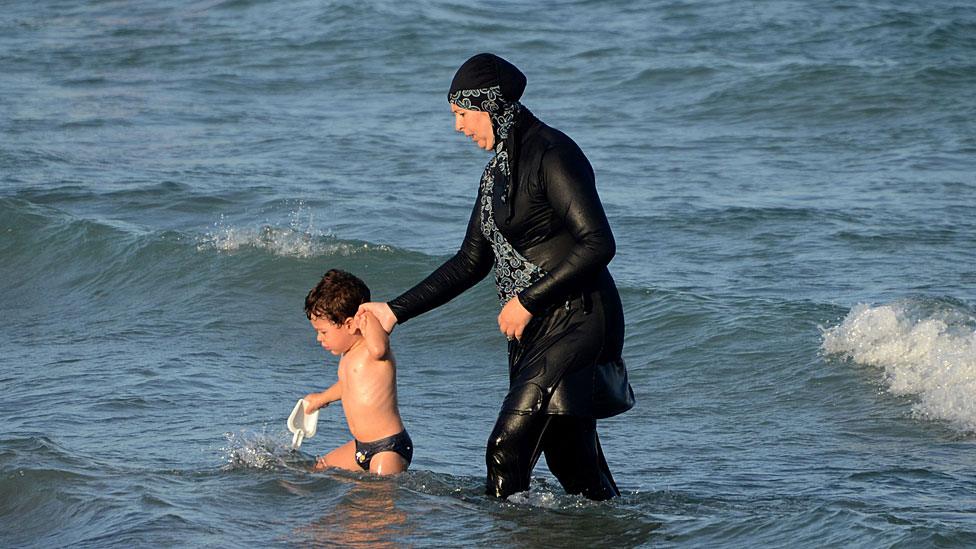Muslim women defy ban to swim in burkinis at French pool
- Published

"Operation burkini" was launched by a group of Muslim and non-Muslim women in Grenoble
Muslim women in France are disobeying the rules at a local swimming pool by wearing burkinis.
In a protest inspired by US civil rights pioneer Rosa Parks, they bathed in suits covering their entire bodies - apart from the face, hands and feet - in the city of Grenoble on Sunday.
The Jean Bron swimming pool is among many in France that ban burkinis.
Many people in the country regard the swimsuit as a symbol of political Islam and incompatible with secularism.
"Operation burkini" was launched last month by members of the group Citizen Alliance of Grenoble to defend what they say is the right of Muslim women.
What happened at the pool?
After changing into burkinis, the Muslim members of the group were told by lifeguards that their swimsuits were not allowed.
Despite this, they entered the pool and bathed for about an hour with members of the community, many of whom cheered and applauded them for doing so.
Allow X content?
This article contains content provided by X. We ask for your permission before anything is loaded, as they may be using cookies and other technologies. You may want to read X’s cookie policy, external and privacy policy, external before accepting. To view this content choose ‘accept and continue’.

The women were later questioned by police and each fined €35 ($40; £30) for breaching the rules, news outlet France Bleu reported (in French), external.
Allow Facebook content?
This article contains content provided by Facebook. We ask for your permission before anything is loaded, as they may be using cookies and other technologies. You may want to read Meta’s Facebook cookie policy, external and privacy policy, external before accepting. To view this content choose ‘accept and continue’.

Speaking to the BBC, two of the Muslim women involved in the protest, Hassiba and Latifa, said they should have the same rights as other citizens.
"We have a dream: to have fun in public swimming pools like all other citizens, to accompany our children whenever they want to have a swim while it is very hot in the summer here in Grenoble.
"We must fight against discriminatory policies and prejudice in France, as we are actually deprived of our civil rights of access to public services and city-owned infrastructures."
In a Facebook post, the Citizen Alliance said the move was part of a campaign that began in May 2018 with a petition signed by more than 600 Muslim women urging the Genoble Mayor Éric Piolle to reform the rules governing public swimming pools.
Responding to events on Sunday, a member of France's centre-right party The Republicans, Matthieu Chamussy said: "Political Islam is moving forward step by step and the cause of women receding."
Allow X content?
This article contains content provided by X. We ask for your permission before anything is loaded, as they may be using cookies and other technologies. You may want to read X’s cookie policy, external and privacy policy, external before accepting. To view this content choose ‘accept and continue’.

Burkinis, a mix of the words "burka" and "bikini", are marketed to Muslim women as a way for them to swim in public while adhering to modesty edicts.
But the burkini remains controversial in France, where authorities in several French towns have proposed banning the garment altogether.
In 2010, France became the first European country to ban the full-face veil in public.
Who was Rosa Parks?
Ms Parks, the woman who inspired the "operation burkini" campaign, was arrested for refusing to give up her seat for white passengers in Montgomery, Alabama, in 1955.
At the time, black travellers were required to pay at the front of the bus, leave it, walk to the back of the vehicle and then re-enter.
They also had to give up their seats for white customers if the bus started filling up.
Ms Parks' protest sparked a bus boycott and eventually led to the end of racial segregation on buses in the US.
- Published29 April 2019

- Published19 September 2016

- Published20 August 2016
